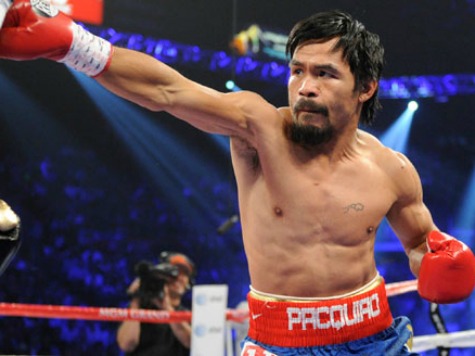Manny Pacquiao’s next opponent is undefeated. He’s also unheralded.
Pac Man named his adversary for his next fight. It’s New Yorker Chris Algieri, who owns wins over Ruslan Provodnikov and Mighty Mike Arnaoutis but just eight knockouts in twenty fights. Bob Arum compares Algieri to Gene Tunney. That’s why he’s the promoter.
But more controversial than the opponent may be the location. As he did last year against Brandon Rios, Pacquiao fights at the Venetian in Macau, China. “It’s almost like fighting at home so it’s a major advantage for Manny,” Arum told Garreth Davies of the Daily Telegraph. “Plus, if he fights in Macau he’s not subject to U.S. income taxes, which are 39.5 per cent.” In other words, Pacquiao fights Algieri and Uncle Sam.
Manny Pacquiao has beaten the likes of Oscar De La Hoya, Ricky Hatton, Miguel Cotto, and Marco Antonio Barrera. But the Internal Revenue Service (IRS) remains undefeated in its fights against such notable opponents as Sugar Ray Robinson and Joe Louis. Robinson, often pegged as the greatest boxer in history, fought well past his sell-by date, which certainly worsened the brain damage he suffered from late in life, because of tax bills. Louis, once the most recognizable athlete on the planet, worked as a casino greeter, competed on game shows, ventured into professional wrestling, and even refereed Joe Frazier-Jerry Quarry II in 1974 as a means to recover from the IRS’s war upon him.
Pacquiao currently finds himself under audit by the IRS–and the Bureau of Internal Revenue back in the Philippines, where political grudges, Pacquiao’s camp claims, have put a target on the national hero and part-time politician.
Pacquiao has stepped into the ring 24 of his last 29 times in the United States, making his decision to compete once a year outside of America a departure from the recent norm. Significantly, 21 of Pacquiao’s 24 total U.S. fights took place in Nevada, Texas, and Tennessee, states which have no traditional income tax (the Volunteer State taxes income on interest and dividends). Money dictates who and where the prize fighter fights. Taxes play a huge role in that.
In fleeing the Land of the Free for less onerous taxation in Red China, albeit in a “special administrative region” not subject to the Communist regime’s normal laws, the welterweight saves a small fortune. Pacquiao stood to earn anywhere between $18 million and $30 million for his last fight in Macau. The pay-per view performed respectably but not remarkably, so it’s unlikely that he earned the minimum or anywhere near the maximum. Had he earned $25 million, the Chinese would have claimed about $3.1 million in taxes. Had Pacquiao fought Brandon Rios in Las Vegas instead of Macau, the IRS would have claimed about $10 million from a $25 million pot. Because Algieri ranks as an opponent in the Brandon Rios range–and not of the stature of nemesis Juan Manuel Marquez–Pacquiao probably will earn somewhere in the neighborhood of what he earned against Rios (Algieri’s purse stands at a meager $1.5 million). And by fighting Algieri in China instead of the U.S., Pacquiao will likely keep about $7 million more from that purse.
Put another way, the federal government’s short-sighted greed ensures that it loses out on millions in tax revenue from Manny Pacquiao and diverts money from U.S. hotels, restaurants, and casinos to ones in Communist China. Manny Pacquiao loses out on perhaps a slightly larger before-taxes purse in the states but scores a larger overall payday by fighting in China.
Pacquiao has learned from the sport’s past greats that the IRS fights without deference to the Marquess of Queensberry. “Momma left a little estate to be divided with the family,” Joe Louis tells in his autobiography about the aftermath of his mother’s 1953 death. “My share was about $660. The tax people took it.”

COMMENTS
Please let us know if you're having issues with commenting.